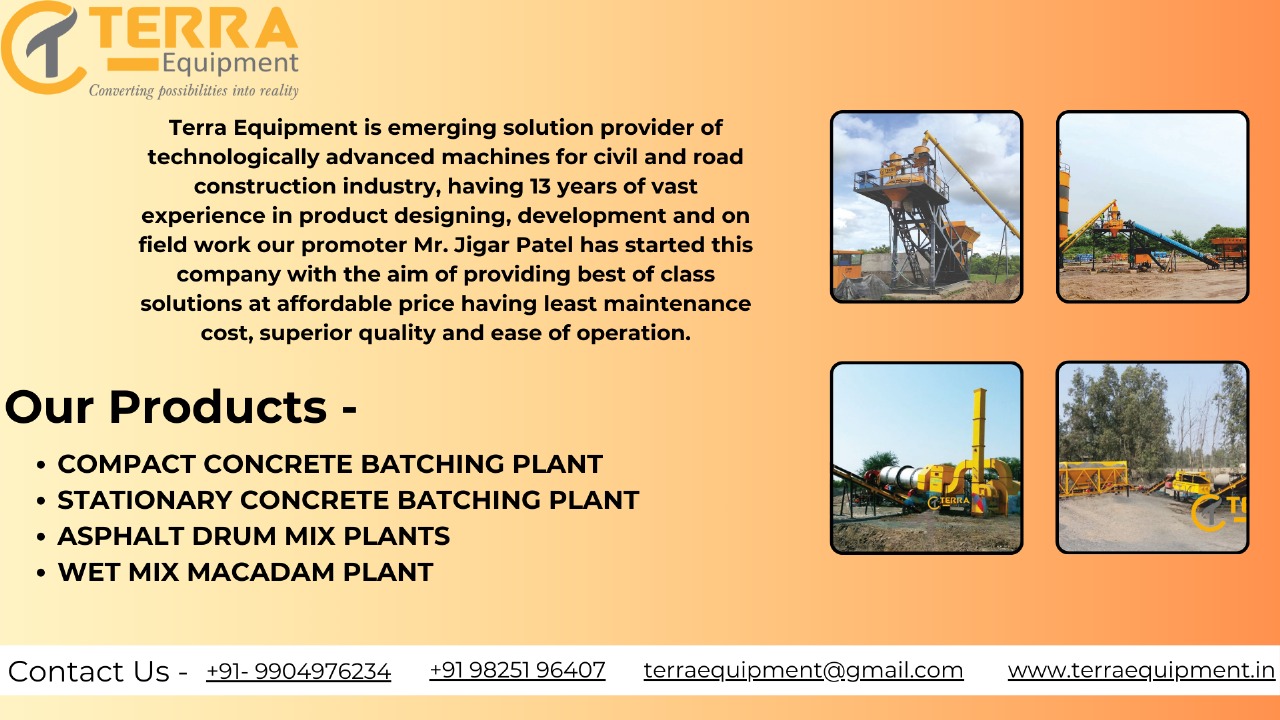Concrete
Mixers Manufacturer
A Concrete Mixers Manufacturer is a specialized
industrial entity that designs, engineers, fabricates, and supplies various
types of concrete mixers used in construction. These manufacturers produce
equipment for mixing concrete ingredients (cement, aggregates, water, and
admixtures) to form a uniform and workable concrete mixture. With a focus on
quality, durability, and innovation, a good concrete mixer manufacturer serves
a wide range of clients, from small contractors to large infrastructure
companies, across residential, commercial, and industrial sectors.
Concrete mixers come in various forms—tilting,non-tilting, drum, pan, twin-shaft, and planetary mixers—each suited for
different applications. A reputable manufacturer offers customization,
automation, after-sales support, and adherence to national and international
standards.
Features
with Uses
|
Feature |
Description & Use |
|
Robust Construction |
Ensures long life and resistance to harsh job-site conditions. |
Variety of Models |
From manual to fully automatic; portable to large
stationary mixers. |
|
Customizable Designs |
Tailored according to specific mixing requirements and
site constraints. |
|
Efficient Mixing Blades |
Designed to mix evenly and quickly for consistent concrete
quality. |
|
Automation Options |
Integration with PLC systems for automatic batching and
mixing. |
|
Corrosion-Resistant Materials |
Protects parts from cement slurry and moisture. |
|
Mobility Solutions |
Mounted on wheels or trailers for site-to-site
transportation. |
|
High Mixing Capacity |
Ranges from 100 liters to over 3000 liters per batch. |
|
Easy Maintenance Access |
Simplified structure for faster repairs and servicing. |
|
Safety Features |
Emergency stops, guards, and interlocks for operator
protection. |
Applications
of Concrete Mixers
- Residential & Commercial Building Construction
- Road
Construction and Highways
- Bridges
and Flyovers
- Precast
Concrete Products Manufacturing
- Dams
and Irrigation Projects
- Railway
Infrastructure Projects
- Tunnel
Construction
- Airport
and Runway Projects
- Urban
Infrastructure (Drainage, Sidewalks, etc.)
- Ready-Mix
Concrete (RMC) Plants
Top 10
Frequently Asked Questions (FAQs)
- Q:
What types of concrete mixers do manufacturers offer?
A: Drum mixers, pan mixers, twin-shaft mixers, planetary mixers, tilting and non-tilting mixers. - Q:
How do I choose the right mixer for my project?
A: Consider factors like project size, required concrete volume, mix consistency, and mobility needs. - Q:
Can concrete mixer manufacturers provide custom-built machines?
A: Yes, most reputable manufacturers offer customization based on client specifications. - Q:
Do they offer after-sales services?
A: Yes, including installation, training, maintenance, and spare parts supply. - Q:
Are mixers compatible with automatic batching systems?
A: Yes, especially pan, planetary, and twin-shaft mixers used in RMC and batching plants. - Q:
What is the power requirement for these machines?
A: Varies from 1 HP to 100+ HP depending on mixer size and capacity. - Q:
How long does a mixer last?
A: With proper maintenance, it can last 10–15 years or more. - Q:
Are safety standards followed in manufacturing?
A: Reputed manufacturers comply with ISO, CE, BIS, and OSHA standards. - Q:
Can mixers be exported internationally?
A: Yes, many manufacturers supply to global markets and handle export documentation. - Q:
What is the typical lead time for delivery?
A: Generally 2–8 weeks depending on model, size, and customization.
Handling
& Operational Guidelines
- Site
Setup: Place mixers on stable, flat ground.
- Power
Supply: Ensure correct voltage and grounding for electric models.
- Loading
Sequence: Add materials in the recommended order (usually aggregates,
cement, water).
- Mixing
Time: Follow manufacturer-specified duration to avoid
over/under-mixing.
- Cleaning:
Wash thoroughly after each batch to prevent buildup.
- Lubrication:
Regularly grease bearings and mechanical parts.
- Inspection:
Daily checks for wear, damage, or loose components.
- Operator
Training: Provide thorough training on safety and operation.
- Spare
Parts: Keep critical spares on-site for minimal downtime.
- Storage:
Cover and secure when not in use, especially during rain.
Benefits
of Choosing a Trusted Manufacturer
- Reliable
Performance: Durable construction for continuous usage.
- Improved
Quality Control: Precision mixing yields superior concrete.
- Reduced
Labor Cost: Automated options decrease manual workload.
- Time
Savings: Faster mixing and discharge increase productivity.
- Low
Maintenance Downtime: Easy servicing and durable components.
- Customization
Options: Solutions tailored to specific project needs.
- Technical
Support: Training, troubleshooting, and warranty services.
- Compliance
with Standards: Assures safety and regulatory approvals.
Key
Points to Remember
- Always select mixers based on your concrete volume and mixing needs.
- Manufacturers
offer a wide range from portable to industrial models.
- Check
for service network, warranty terms, and spare parts availability.
- Opt
for automated or semi-automated models for large-scale work.
- Use
mixers with high-efficiency blades for homogenous mix quality.
Conclusion
A Concrete Mixers Manufacturer plays a vital role in
the construction industry by providing essential equipment for consistent and
efficient concrete production. The right manufacturer offers a balance of
quality engineering, affordability, innovation, and customer support. Whether for
a small housing project or a massive infrastructure development, choosing a
reliable mixer from a reputed manufacturer enhances project quality, speeds up
construction timelines, and ensures cost efficiency.
Contact
Us For More Details On :-
Call :- +91 98251 96407, +91 99049 76234
Email :- terraequipment@gmail.com
Address :- Survey No- 231, Dediyasan Village, Opp Lilaba
Weigh Bridge , Mehsana -384002 Gujarat
Facebook :- www.facebook.com/people/TerraEquipment/100063801460520/?ti=as
Instagram :- www.instagram.com/terraequipment
Youtube :- www.youtube.com/c/TerraEquipmentmehsana
Website :- www. terraequipment.in

